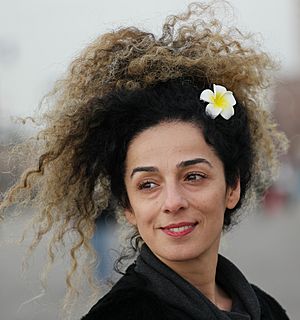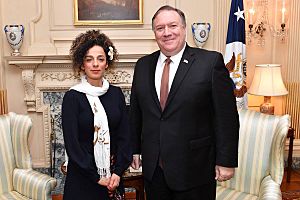Masih Alinejad facts for kids
Quick facts for kids
Masih Alinejad
|
|
|---|---|
| مسیح علی نژاد | |

Alinejad in 2018
|
|
| Born |
Masoumeh Alinejad-Ghomikolayi
September 11, 1976 Qomi Kola, Babol, Imperial State of Iran
|
| Nationality | Iranian |
| Citizenship | United States |
| Education | Oxford Brookes University |
| Occupation | Journalist and author |
| Years active | 2001–present |
| Employer | U.S. Agency for Global Media |
| Spouse(s) |
Max Lotfi
(divorced)Kambiz Forouhar
(m. 2014) |
| Children | 1 |
Masih Alinejad (Persian: مسیح علینژاد, born Masoumeh Alinejad-Ghomikolayi (Persian: معصومه علینژاد قمیکُلایی), September 11, 1976) is an Iranian-American journalist, author, and women's rights activist. Alinejad works as a presenter/producer at Voice of America Persian News Network, a correspondent for Radio Farda, a frequent contributor for Manoto television, and a contributing editor for IranWire. Alinejad focuses on criticism of the status of human rights in Iran, especially women's rights. Time magazine named her among its 2023 honorees for Women of the Year.
She lives in exile in New York City, and has won several awards, including the 2015 Geneva Summit for Human Rights and Democracy women's rights award, the Omid Journalism Award from the Mehdi Semsar Foundation, and a "Highly Commended" AIB Media Excellence Award. In 2019, Alinejad sued the Iranian government in a U.S. federal court for harassment against her and her family. She released a book in 2018 called The Wind in My Hair that deals with her experiences growing up in Iran, where she writes girls "are raised to keep their heads low, to be unobtrusive as possible, and to be meek". According to U.S. prosecutors, she has been the target of a kidnapping plot and multiple assassination plots by the Iranian government.
Contents
Early life and journalism career in Iran
Alinejad was born as Masoumeh Alinejad, but uses the first name "Masih" (Persian for "anointed" or "Messiah"). She was politically conscious from a young age, and was arrested in 1994 for producing leaflets critical of the government.
Alinejad wrote in her memoir that she got her start in journalism with the help of Marjan Sheikholeslami. She began her journalism career in 2001 with the local daily Hambastegi, and then worked for the Iranian Labour News Agency (ILNA). Other publications such as Shargh, Bahar, Vaghaye Ettefaghiye, Ham-Mihan, and Etemad, have also published her work. During the sixth and seventh parliament, Alinejad was a parliamentary reporter. In 2005, she wrote an article suggesting that government ministers had claimed they received pay cuts; they were actually receiving considerable sums of money as "bonuses" for everything from serving religious duties to ringing in the New Year. The article generated controversy, and led to her dismissal as a parliamentary reporter.
In 2008, Alinejad wrote an exceptionally critical piece in Etemad, called "Song of the Dolphins", in which she compared Iranian President Mahmoud Ahmadinejad's followers to hungry dolphins that make sounds and perform entertaining acts to grab a morsel of food from their trainer. Some supporters of Ahmadinejad expressed their sense of outrage and offense, eventually forcing the director of the newspaper Mehdi Karroubi, himself a relatively popular and very powerful establishment politician and cleric, to publicly apologize.
In the summer of 2009, during her stay in the United States, Alinejad tried very hard to get an interview with Barack Obama; however, she was refused the interview, although she had been granted a temporary visa on that very basis. When her visa expired, she was forced to return to the United Kingdom. While in the United States, she participated in some Iranian anti-government protests, and delivered a speech in San Francisco, where she said, addressing the authorities of Iran, "We have trembled for thirty years, now it is your turn to tremble." Her interview with Voice of America was shown together with parts of the videos she had made, called "A Storm of Fresh Air". In 2010, she and a group of Iranian writers and intellectuals established the "IranNeda" foundation. After the presidential election in Iran in 2009, she published a novel called A Green Date. Alinejad graduated from Oxford Brookes University with a degree in Communications Studies.
Career
Opposition to Iranian government
In 2014, Alinejad launched My Stealthy Freedom (also known as Stealthy Freedoms of Iranian Women), a Facebook page that invites Iranian women to post pictures of themselves without a hijab. The page quickly attracted international attention, and has garnered hundreds of thousands of likes. In 2015, the Geneva Summit for Human Rights and Democracy, awarded her its women's rights prize for "giving a voice to the voiceless and stirring the conscience of humanity to support the struggle of Iranian women for basic human rights, freedom, and equality".
On June 13, 2022, she was awarded the American Jewish Committee's Moral Courage Award for speaking out fearlessly in support of the Iranian people being oppressed by the Iranian government.
Alinejad has said she is not opposed to the hijab per se, but believes it should be a matter of personal choice. In Iran, women who appear in public without a hijab risk being arrested, imprisoned, and fined.
Journalism
Masih Alinejad wrote in her book: "Marjan Sheikholeslami, the head of the political department of Hambastegi newspaper agreed to take me under her wing." Since 2015, Alinejad has hosted a weekly 15-minute primetime show called Tablet for Voice of America's Persian Language Service. "With original video from inside Iran, Tablet profiles ordinary citizens and connects them with Americans through short interviews on common themes illustrating both similar and different experiences. The program also has a weekly "timeline report", tracing the development of issues such as the international women's rights movement and relations between Washington and Tehran", the press release states.
In July 2019, Iranian authorities warned the public that anyone sending videos to Alinejad faced up to 10 years in prison. Musa Ghazanfarabadi, the head of Tehran's Revolutionary Court, told Fars News that those sharing protest videos with Alinejad could be imprisoned for up to a decade under laws relating to cooperating with an enemy of the state.
Anti-compulsory hijab campaign
Alinejad has been critical of the Islamic Republic of Iran's laws making it illegal for women not to wear a hijab outside the home, but also making the broader point that in the current historical and political context – in previous decades it wasn't required or common in Iran and many other Muslim-majority countries – describing it as the most visible symbol of oppression, Journalist Kim Ghattas has described Alinejad as "spearheading" the campaign against the mandatory veil in Iran even from her residence in Brooklyn.
From 2012 to 2019, Alinejad created and promoted multiple campaigns including #WhiteWednesdays, #MyCameraIsMyWeapon, #MyPenIsMyWeapon, #MenWithHijab to mobilize anti-mandatory hijab movement in Iran.
Some feminists have supported Alinejad's campaign because, in their view, the Islamic veil is the most visible example of women's oppression in Muslim majority societies. However, postcolonial feminists criticized the campaign for invoking the old "Orientalist cultural imagination" in the West, which was based on stereotypes of oppressed women in the Orient who need to be liberated by adopting Western ideals. Islamic feminists, meanwhile, viewed this effort as bolstering the rising wave of Islamophobia in Europe and the United States, which portrays Islam as a misogynist religion. Alinejad rejects accusations of Islamophobia while insisting that it is religious laws (Sharia) which scare her, and that it is that same religious fanaticism that is the primary cause of Islamophobia. Speaking about hijab during a debate with Palestinian-American activist Linda Sarsour on CNN, Alinejad said: "It's important if you care about human rights, women's rights, you cannot use the same tool which is the most visible symbol of oppression in the Middle East and say that this is a sign of resistance [in the United States]."
After the Christchurch mosque shooting in March 2019 in New Zealand, Alinejad criticized New Zealand Prime Minister Jacinda Ardern for wearing a hijab ostensibly in sympathy and respect to the Muslim victims. She said she "felt that you are using one of the most visible symbols of oppression for Muslim women in many countries for solidarity, and it also broke my heart".
Chess championship boycott
In 2016, Alinejad launched a boycott campaign against the 2016 women's chess world championship, to be held in February 2017 in Tehran, Iran. The campaign was incited by Nazí Paikidze, a Georgian-American chess player. Paikidze, a non-Iranian, refused to attend world championships in Tehran because according to Iran's religious law, female players would be forced to wear a hijab. Alinejad supported Paikidze, and co-wrote an op-ed with Indian-American Asra Nomani in The Washington Post.
Meeting with U.S. Secretary of State
In February 2019, Masih Alinejad met with U.S. Secretary of State Mike Pompeo. US State Department Deputy Spokesperson Robert Palladino said Secretary of State "thanked Ms. Alinejad for her bravery and continued dedication". Alinejad said they met for 35 minutes and she highlighted three areas. First, "Many Iranians want an end to the Islamic Republic. Opposition voices should be heard". Second, the international community should focus on 40 years of human rights violations by the regime, and third, the Trump administration travel ban hurts human rights activists and students, not the regime.
Women, Life, Freedom movement
During the Mahsa Amini protests, an internet blackout followed by a cyber attack targeted "the Covenant", the movement's initial leader, leaving the protesters without direction. In the aftermath, key Iranian opposition figures outside the country—Reza Pahlavi, Crown Prince of Iran, soccer player Ali Karimi, dentist Hamed Esmaeilion, and women's rights activist Masih Alinejad—formed a coalition. They amplified their message through media outlets such as BBC and Iran International, assuming leadership of the movement.
Despite concerns from many, including members of the Covenant, who believed the movement had been "hijacked" or "emotionalized," the protests persisted for several more months before eventually collapsing. A few weeks later, the coalition itself disbanded.
Recognition
Awards
- AIB Media Excellence Award for Radio Farda's production "Victims of 88", Nov 2013
- Inaugural Women's Rights Award at the Geneva Summit, 2015
- Freethinker Prize by Swiss Freethinkers Association, 2017
- America Abroad Media award, Nov 2019
- Moral Courage Award by American Jewish Committee (AJC), Jun 2022
- Oxi Courage Award for her fight against Iran's compulsory hijab, Oct 2022
- Scholar-Statesman Award by Washington Institute for Near East Policy for her tireless promotion of women's rights, freedom, and political change in her native land, Nov 2022
- Global Impact Award, Dec 2022
Other recognitions
- Nominated for the Nobel Peace Prize for her advocacy for women's rights in Iran, 2022
- Named as one of the 12 Time Magazine's Women of the Year, March 2023
Books
Alinejad's memoir, The Wind in My Hair ISBN: 9780349008967, dealing with her journey from a tiny village in northern Iran to becoming a journalist and creating an online movement that sparked a nationwide protest movement, was published by Little Brown in 2018. The New York Times wrote that the book paints a vivid portrait of modern Iran, saying that it was written with a "blunt honesty" that it considered to be a characteristic of Alinejad's life and writing.
She has published four books in Persian:
- Tahasson – which describes the political turmoil/challenges created when the "Sixth Iranian Parliament" went on strike.
- Taj-e-Khar (The Crown of Thorns) – a novel that is now being translated into English. It refers to the passion of the Christ and the crown of thorns placed on his head by the Romans.
- I am Free – which deals with women's issues in Iran, published in Germany because of its being blacklisted by the Islamic Culture and Guidance Ministry, Iran's censorship body.
- Gharar Sabz (Green Rendezvous) – which deals with post-2009 presidential election fraud violence. This book was also published in Germany, for the same reasons.
See also
 In Spanish: Masih Alinejad para niños
In Spanish: Masih Alinejad para niños
- Guardianship of the Islamic Jurist
- Islamic Revolution
- Islamic Revolutionary Court
- Theocracy
- Pouria Zeraati




